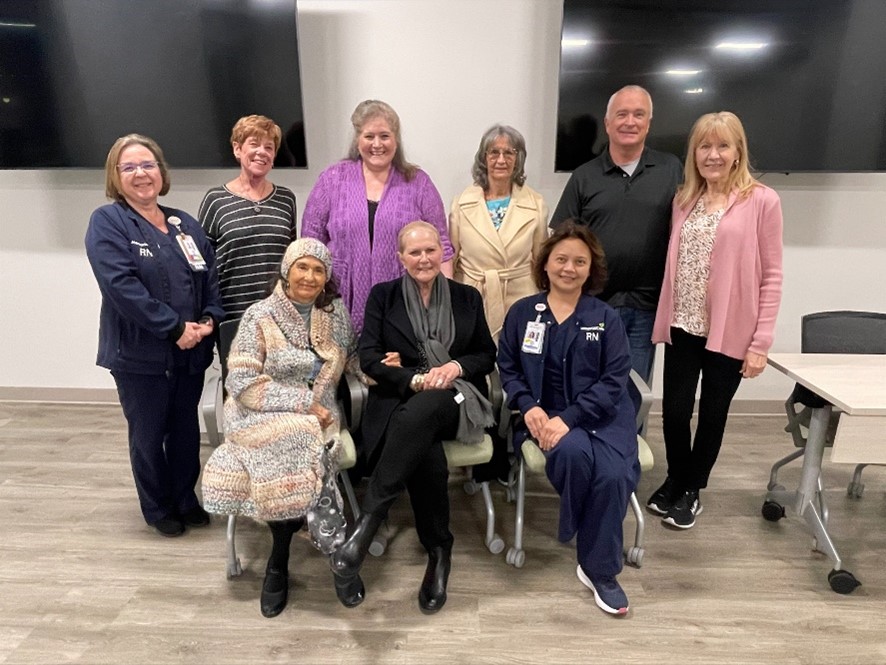
The MemorialCare Spine Health Center at Saddleback Medical Center formed a partnership with Spinal Hope to create a Spinal Support Group offering spine patients medical, mental and emotional support through their treatment and rehabilitation. The Spine Support Group offers a relaxed environment where spine patients can seek advice on treatment and rehabilitation from those experiencing similar challenges.
“Our team understands spine patients can feel alone when trying to find answers and the right treatment for them,” says Ildiko Vitez, nurse navigator, MemorialCare Spine Health Center at Saddleback Medical Center. “The Spinal Support Group provides a safe space for patients by having them interact with other patients who feel the same physical and emotional pain they feel. This way, our patients feel comfortable sharing their stories and asking questions they normally wouldn’t share in front of others.”
The idea for a Spine Support Group started when Nicole Bohay, a former Saddleback Medical Center spine patient, endured a severe spinal injury from a car accident.
“I remember struggling so much to relearn how to do everyday tasks that I wanted to die,” says Bohay. “I was trying to find myself again after losing my livelihood – it was intense physical and emotional pain unlike anything else I’ve ever experienced.”
Having navigated much of her medical journey solo, she sought to pay it forward by ensuring no other spine patient endured rehabilitation and recovery alone.
“At first I wanted to volunteer at Saddleback Medical Center to share my story with others,” says Bohay. “Pretty soon, I realized that there was a bigger need for emotional support than just myself – we needed a village.”
Nicole introduced the spinal support group concept to Brian Hwang, M.D., neurosurgeon, MemorialCare Spine Health Center at Saddleback Medical Center, who connected her with
Susan Haslam, another former spine patient at Saddleback Medical Center, who shared Nicole’s journey of physical and emotional challenges. This newfound connection gave rise to Spinal Hope.
Spinal Hope is a non-profit organization, operating as a peer-facilitated, self-help support group. Its members organize and manage the group, providing support, education, and hope to all spine patients in South Orange County.
“Spine pain is very traumatic physically, mentally and emotionally – it’s a pain you can’t see visually, unlike other injuries,” says Haslam. “Nicole and I wanted to create something where patients, both former and current, could navigate those overwhelming emotions with other people experiencing the same thing.”
The inaugural Spine Support Group, jointly hosted by MemorialCare Spine Health Center at Saddleback Medical Center and Spinal Hope, began in early Feb and they have already seen five patients. Subsequent meetings are scheduled for the third Thursday of each month. Each session will feature a guest speaker who will engage attendees in discussions about navigating the challenges of spine treatments, including physical therapy, acupuncture, meditation, psychiatric therapies, as well as surgery and spinal cord stimulation procedures. At the first meeting, Dr. Hwang shared his firsthand perspective as a former Green Beret combat medic and neurosurgeon who has personally grappled with spine issues throughout his life. During the most recent meeting, a nurse practitioner joined to discuss the relationship between pain and depression, and what people with spinal conditions and chronic pain can do to become more emotionally resilient and hopeful.
“I’m honored to be a part of this support group – it’s important for us to be surrounded by other people who can sympathize with our pain,” says Dr. Hwang. “Spinal Hope will help more people be self-advocates for their spine health and to support each other through the tough times – there is no group like this out there, and I am excited to see the group already affecting lives.”